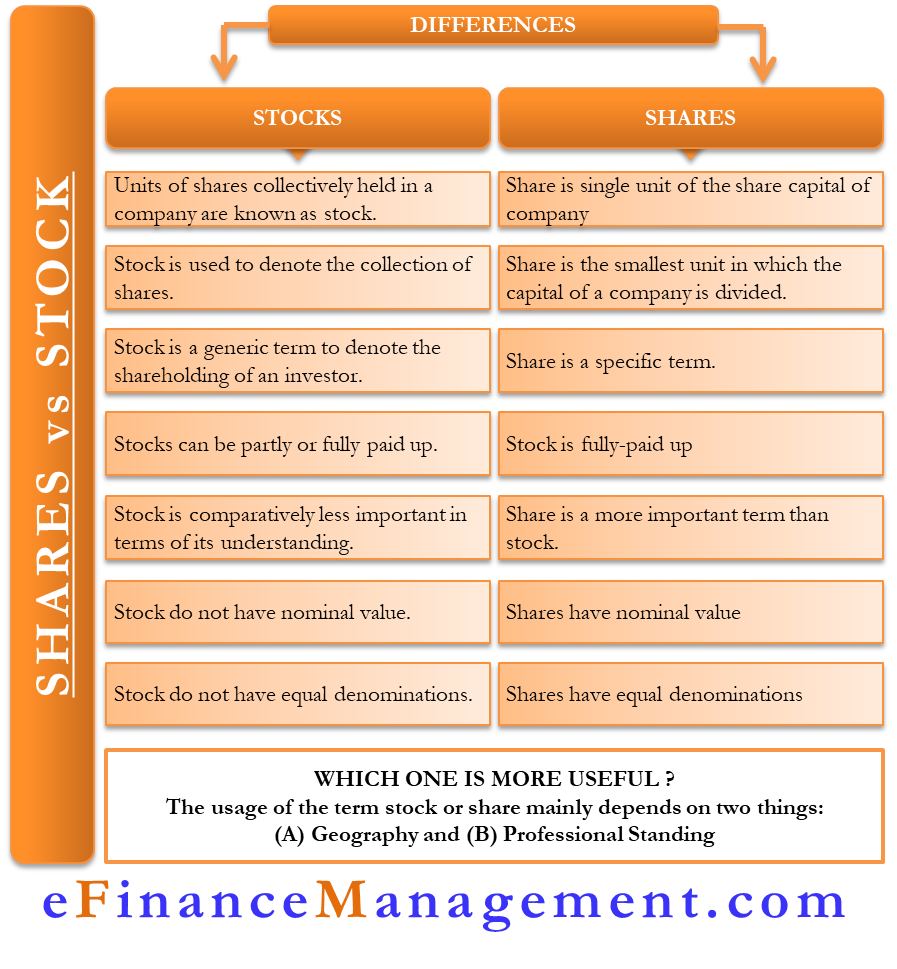Most of the time, the difference between stock and share is not evident enough to be taken note of. Therefore, people use both terms interchangeably to talk about the equity of a company. However, there is a major difference between stocks vs shares that should be known to all.
Before we detail the difference, let us see what both these terms mean:
Stocks vs Shares – Definition
Stock refers to the equity ownership in a company or company. This means that an individual holding the stock in a company has ownership in the company. These individuals have the right to profit, assets and dividends. Stockholders get the dividend and have the voting right, and may form a part of the board of directors.
On the other hand, a share represents the ownership of a single company. The ownership in the company is directly dependent on the number of shares that a shareholder owns. For instance, if one investor has 50 shares and the other person has 100 shares, then the one with 100 shares has more voting right.
Stocks vs Shares – Differences
Following are the differences between Stocks vs Shares:
Basic Difference
One of the simplest ways of explaining the difference between stock vs share is that while the former is a large collection of shares, the latter is just a small unit of stock. Share is the single unit of the share capital of the company, which defines the ownership of the shareholder. Units of shares collectively held by an individual in a company are known as stock.
Also Read: Equity Share and its Types
Relation
Share is the smallest unit in which the capital of a company is divided. Stock, however, is used to denote the collection of shares.
Relationship with Owner
If an investor owns shares of many firms, one can say that they own the stocks. On the other hand, if an investor owns the shares of a particular company, one can say that they own shares.
Term
Stock is a generic term to denote the shareholding of an investor. On the other hand, the share is a specific term. For instance, if we say A has invested in stocks, it could mean that A has a portfolio of shares. And, if we say A has invested in shares, then the next question could be of which company and how many shares.
Paid-up
While the stock is fully-paid up, shares could be partly or fully paid up.

Type of Stocks and Shares
There could be various types of stocks. Usually, the stocks are classified as per the company which issues them. If a tech company is issuing a stock, then the stock is an IT stock. Likewise, if a financial company is issuing a stock, then it is a financial stock. Similarly, there are growth stocks, blue-chip stocks, value stocks, small-cap, mid-cap, large-cap stocks,s and so on. There is one more type of stock known as founder stock issues by a company to its founder or early-stage investors.
On the other hand, the share could vary depending on the rights and features associated with it. For instance, there could be preference share, right share, common share, etc. Preference shares are just like bonds for the shareholders as they guarantee the dividend. Similarly, there could be many types of common shares on the basis of voting rights they enjoy. For instance, Class A common stock might get one voting right per share, and Class B might have 10 voting rights per share, and so on.
Dividends and Voting Rights
Though owing both stock and share give you a dividend and voting right. But, how much dividend or voting right you get depends on the number of shares you own. Both dividend and voting right is decided on a per-share basis. So, the more the number of shares you own, the more voting right you get.
Importance
Share is a more important term than stock. Understanding shares will help you to understand the concept of par value, face value, discount, premium, and more.
Value and Denomination
While shares can have a nominal value, stocks do not have a nominal value. On the other hand, shares have equal denominations, while stocks will have unequal denominations.
Which is More in Use?
The usage of the term stock or share mainly depends on two things:
Geography
Often the use of the term also depends on the country you are in. For instance, people prefer to use the term stock in the United States when discussing equity. Elsewhere in the world, the share is more commonly in use.
Professional Standing
The market role of a person also justifies, to some extent, the use of the term share or stock. For instance, the analyst might often prefer the term stock, whereas the stockbroker will mostly ask the investor to specify the number of shares they want to buy.
Final Words
As said above, the primary difference between the stock vs share is what they refer to. The term stock is generally in use when talking about the equities markets in general. On the other hand, the share is usually used when talking about a unit of measure. Apart from this, there is no other major difference between the two, and thus, it may not be wrong if you are using the terms interchangeably.

